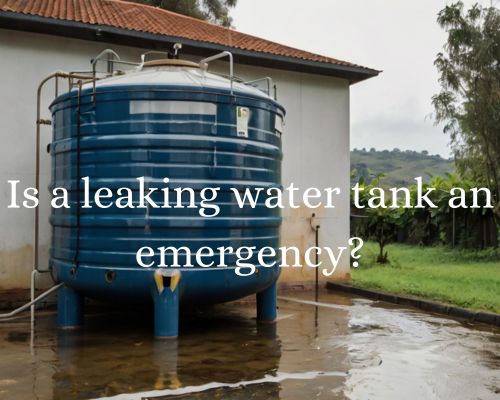
Is a Leaking Water Tank an Emergency?
What You Need to Know
A leaking water tank can pose significant concerns for homeowners. These include safety and potential property damage.

If your water tank is leaking, it’s crucial to determine whether this constitutes an emergency. Identifying the source of the leak and assessing the risk quickly can prevent severe issues such as flooding or compromised structural integrity.
One of the primary dangers of a leaking water tank is the risk of a pressure or temperature-related explosion. This is especially true if it involves the temperature and pressure (T&P) valve malfunctioning. Small leaks might indicate a more significant underlying problem that, if left unaddressed, could escalate.
It’s essential to shut off the power and water supply to prevent further damage and potential hazards, ensuring your home’s safety.
Costly water damage is another potential outcome of an unchecked leaking water tank. Not only could this lead to expensive repairs to your home, but a sudden rise in utility bills might also be a sign of a hidden leak.
“Immediate action is recommended to mitigate these risks and protect both your property and your peace of mind.” said Dean Owens from Plumber Warragul.
Identifying and Diagnosing a Leak
When facing a leaking water tank, it’s important to swiftly identify and diagnose the problem. This will help prevent further damage and ensure the safety of your household.
Understanding the signs, taking immediate action, and assessing the severity are crucial steps.
Sources and Signs of Leaks
Leaks can originate from various sources within and around your hot water system. Common sources include:
- Pipe connections: Loose or corroded joints can leak.
- Drain valve: Failure can result in water leakage.
- Pressure relief valve: Excess pressure might cause it to release water.
- Cracks in the tank: Physical damage or corrosion can lead to leaks.
Signs of a water leak include:
- Damp spots or water stains near the tank.
- Moisture around pipe joints.
- Rust on the tank, indicating corrosion.
- Unusual hissing or banging sounds from the hot water system.
Pay attention to any unexpected increases in your water or energy bills, as they can indicate a hidden leak.
Immediate Steps to Take
First, ensure safety by turning off the power supply to the tank. For an electric water heater, switch off the circuit breaker. For a gas water heater, turn off the gas supply.
Next, locate and turn off the water mains to stop the flow to the tank. This will prevent further water damage.
Use a towel or mop to address minor leaks temporarily. For safety and efficiency, you may need to call a plumber, see Dean Owens from Plumber Warragul.
Monitoring the severity of the leak before the plumber arrives is important.
Listen for sounds of water flow and check for increasing moisture.
This can help you provide useful information when you seek professional help.
Assessing the Severity
Begin by visually inspecting the hot water system for any signs of deterioration. Check areas around pipe connections, the pressure relief valve, and the drain valve. Look for any corrosion or cracks on the tank surface.
Determine how much water is leaking. If it’s a slow drip, it might be due to minor issues like a loose pipe connection or a faulty valve.
Significant water loss indicates a more severe problem, such as internal corrosion or a major crack.
Assess the impact of the leak on your household.
If you experience low water pressure or insufficient hot water, the leak could be affecting the tank’s efficiency.
A quick call to a plumber can help accurately diagnose and resolve the issue, ensuring your hot water system is effectively repaired.
Repair and Prevention Strategies
Addressing a leaking water tank involves both immediate repair measures and long-term prevention strategies. Knowing when to call a professional and how to perform simple maintenance can significantly extend the life of your tank.
Professional Repairs and Replacement
When faced with a severe leak, engaging a licensed plumber or a professional technician is the best course of action.
Professionals can accurately diagnose issues such as a faulty pressure relief valve or worn-out seals. They also have the tools to replace or repair damaged anode rods, pressure relief valves, and other critical components.
For major issues, replacement of the entire tank might be necessary.
If the tank is old or extensively damaged, a full replacement ensures safety and efficiency.
Water heater leaking, especially in gas heaters, should always be inspected by experts to prevent hazards.
DIY Maintenance and Fixes
Regular maintenance can prevent many leaks. Simple DIY tasks include inspecting seals, valves, and checking the anode rod.
Flushing the tank periodically removes sediment build-up, which can cause leaks.
For minor cracks in polyethylene tanks, you may need to drain the tank and clean the area before applying a repair kit.
Always turn off the water supply and power source when performing DIY fixes to ensure safety.
Keeping the T&P valve and screens free of debris is also crucial.
Considering Tank Alternatives
If leaks are frequent, consider alternatives like a tankless water heater or a solar hot water system.
Tankless options provide an endless hot water supply without the risk of storing large volumes of water that could leak.
Solar systems are environmentally friendly and can reduce long-term costs.
Assess the size of your household and water usage needs when choosing the best water heating solution for you.
Switching to a new system may involve initial costs but provides reliability and efficiency in the long run.